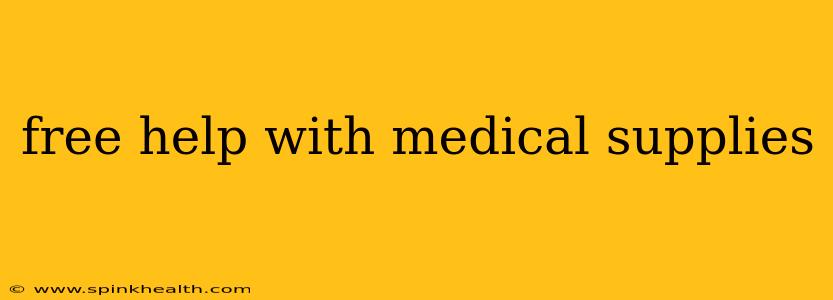Finding Free or Low-Cost Medical Supplies: A Guide to Navigating Resources
The rising cost of healthcare is a significant concern for many, and the expense of medical supplies can be particularly burdensome. Finding free or low-cost medical supplies can feel like searching for a needle in a haystack, but with the right information and resources, it’s entirely possible. This journey started for me when my grandmother, a vibrant woman with a contagious laugh, was diagnosed with a chronic illness. The sheer cost of her supplies was overwhelming, and it spurred me to research every avenue available. This article shares what I learned, hoping it can ease the burden for others.
Where Can I Get Free Medical Supplies?
This is the question I asked most frequently, and the answer isn't always straightforward. There's no single, universal source for free medical supplies. However, several avenues can lead to significant assistance, often depending on your specific needs and circumstances.
1. Patient Assistance Programs (PAPs):
Many pharmaceutical companies and medical supply manufacturers offer patient assistance programs. These programs provide free or heavily discounted medications and supplies to individuals who meet certain income and other eligibility requirements. Think of them as a lifeline, designed to ensure access to essential treatments. Each company has its own application process, so it's crucial to check the individual websites. The application process can sometimes be lengthy and require documentation, but the potential savings are often worth the effort.
2. Local Charities and Nonprofits:
Local charities and nonprofits often play a crucial role in providing support to those in need. These organizations are often grassroots efforts driven by community members and volunteers. They frequently have access to donated medical supplies or funds to help purchase them. A simple online search for "medical supply assistance [your city/state]" can reveal a wealth of options. Don’t hesitate to contact several organizations – some may specialize in specific conditions or supplies.
3. Hospitals and Healthcare Systems:
Some hospitals and healthcare systems have social work departments or financial assistance programs that can help patients access needed medical supplies. These programs may offer direct assistance or connect you with other resources. Don't hesitate to reach out to the hospital's social services department or billing department—they're often a great starting point.
4. Government Programs:
Depending on your location and specific circumstances, government programs such as Medicaid or Medicare may cover some or all of the cost of your medical supplies. Eligibility criteria vary, so it's important to thoroughly investigate whether you qualify. Don't assume you don't qualify without checking—you may be surprised.
5. Religious Organizations:
Many religious organizations offer assistance to those in need, including providing medical supplies. Your local church, synagogue, mosque, or other religious community may have resources or connections to organizations that can help.
How Can I Get Low-Cost Medical Supplies?
Even if free supplies aren't readily available, exploring options for low-cost supplies is crucial. Here are a few avenues to explore:
1. Generic Brands:
Generic versions of many medical supplies are available at significantly lower prices than name-brand options. Often, the quality is comparable, offering a cost-effective solution.
2. Online Retailers:
Many online retailers offer medical supplies at discounted rates. Comparing prices across multiple sites can help you find the best deals. However, always verify the legitimacy of the retailer and ensure the supplies are from reputable sources.
3. Medical Supply Discount Programs:
Several organizations offer discount programs for medical supplies. These programs may provide discounts on a range of products, potentially offering significant savings over time.
4. Negotiating with Suppliers:
Don’t be afraid to negotiate prices directly with medical supply providers. Many are willing to work with patients who demonstrate a genuine financial need.
My grandmother's journey, though challenging, taught me the importance of persistence and resourcefulness. Navigating the world of medical supplies can be daunting, but by exploring these resources and remaining persistent, you can significantly alleviate the financial burden and focus on what truly matters – your health and well-being. Remember, asking for help is a sign of strength, not weakness.

